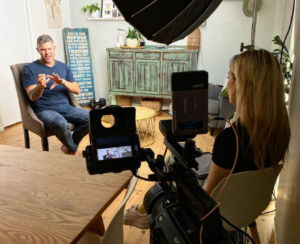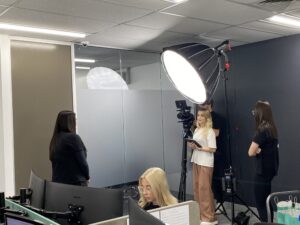
Following on from parts one and two of our ‘filming interviews’ series, establishing rapport with interviewees is key. The importance of the relationship between interviewer and interviewee cannot be overstated. Instilling ease and confidence in your interviewee will go a long way in achieving your desired video. Here are some insights into making the person feel comfortable and confident that I’ve gained from my experience in television, corporate media, and my studies in Psychology.
Establish rapport.
I always give a genuine compliment to interviewees. Find something you appreciate about them and call it out. When someone feels confident and seen, they give their best. Without making it about yourself, you can also find common ground. Perhaps you both just dropped your kids at school, went to the same university or support the same sports team. Common ground aside, find a point of interest that matters to them. They might like to talk about their kids’ school achievements, or their frustrations with the morning traffic. Additionally, let them know you’re personally invested in the project and looking forward to hearing what they have to say. If they like you and feel comfortable with you (and vice versa) it’s going to be a good experience and you’ll achieve a much better result.

Speak up, give feedback.
I recently interviewed a scientist who spoke about the use of light metres in their work. After he answered my question I commented ‘That’s interesting to me because in cinematography we use light metres too’. He was taken aback and said ‘Oh, you’re actually listening to everything I’m saying?’. From there the interview went to new depths because he knew he had a genuine captive audience. As a general rule, after each answer I provide a brief response to acknowledge what they have just said before moving on. I make it as specific as possible, – so not just something generic like ‘okay good‘. In giving feedback, be careful not to talk over them or interrupt. Of course there are exceptions to the interruption rule, but those are rare.
When establishing rapport with interviewees, work out what they need.
Try to get a sense of what the individual responds well to. Some people need affirmation. It’s terrible to see an interviewee being abruptly instructed and criticised when it’s clear all they need in order to shine is some encouragement. This is often applicable to people who are not frequently on camera, or are reluctant to be. Other people don’t have time for nice words, they want straightforward direction and constructive criticism. This is often applicable to high level executives or leaders. These people will generally want reassurance that you know exactly what you are doing and why, but they don’t want superfluous details that they didn’t ask for.
Give out what you want to get back…
…Because people will mirror your energy. If you want to see authority and confidence, sit up straight and maintain eye contact. Sometimes you’ll need openness, so offer a little vulnerability yourself. If the aim is humour and levity, then joke and laugh. When brevity is needed, make your questions succinct. If the goal is warmth, smile and lean in. If the person is visibly uncomfortable, then breathe deeply, don’t cross your arms or legs, lean back and remain calm. These examples could go on and on, but you get the point. If you want to elicit something from an interviewee, demonstrate it to them in your demeanour. This is one of the most subtle yet effective forms of directing interviews.

Know the person and their context.
When establishing rapport with interviewees remember that cultures, religions and social groups have unique customs. For example in some cultures it is considered inappropriate for people of different genders or social status to maintain eye contact. It’s impossible to know all the nuances of every individual, but if you know who you’ll be interviewing, you can do some preparation.But bear in mind not to make assumptions. Just because someone appears to belong to a certain group, doesn’t mean they subscribe to all the standard customs. To the best of your ability, be aware and prepared, but take your cues from them rather than imposing what you think they will be comfortable with.
In establishing rapport with interviewees… be yourself!
A great interviewer doesn’t impose their style and personality on an interviewee, but at the same time they are not a blank slate or carbon copy, they bring something to the table. There are unique things that only you will be able to draw out of others. So with all the above points in mind, remember to be yourself and follow what feels authentic.
If you haven’t already, you can find helpful information on other aspects of filming interviews in parts one and two of this blog series. If you’re not confident conducting interviews, or if you feel it would be better done by a professional, let the Rocket Productions team know. We can provide you with a great interviewer to bring the best out of your talent.
